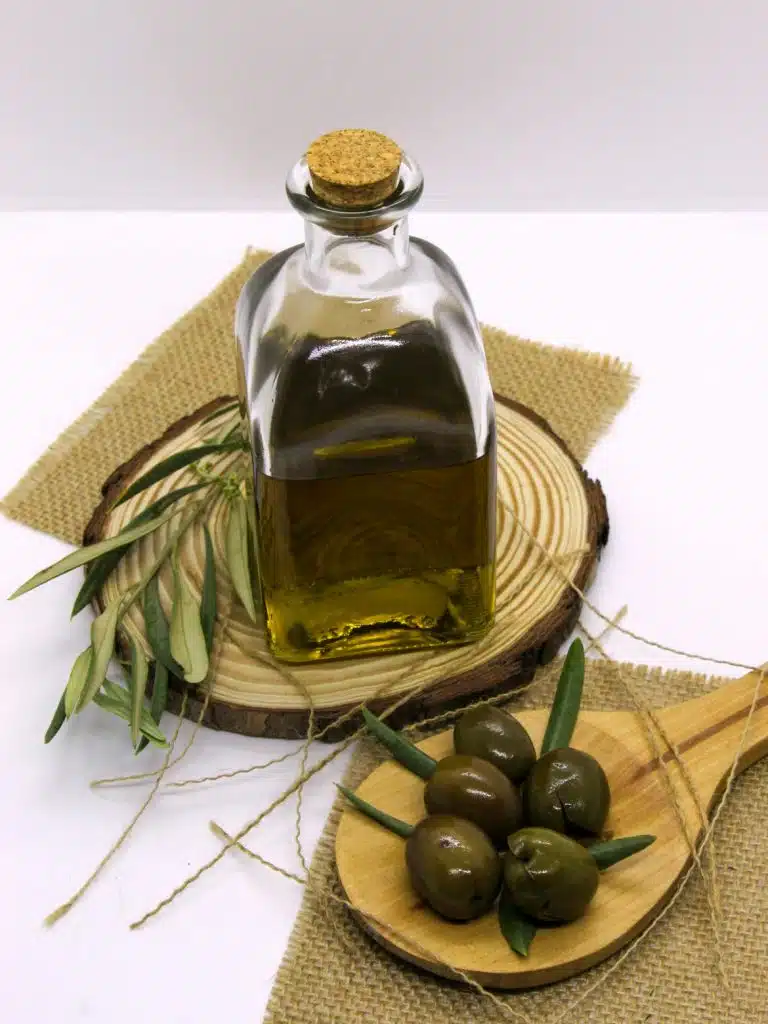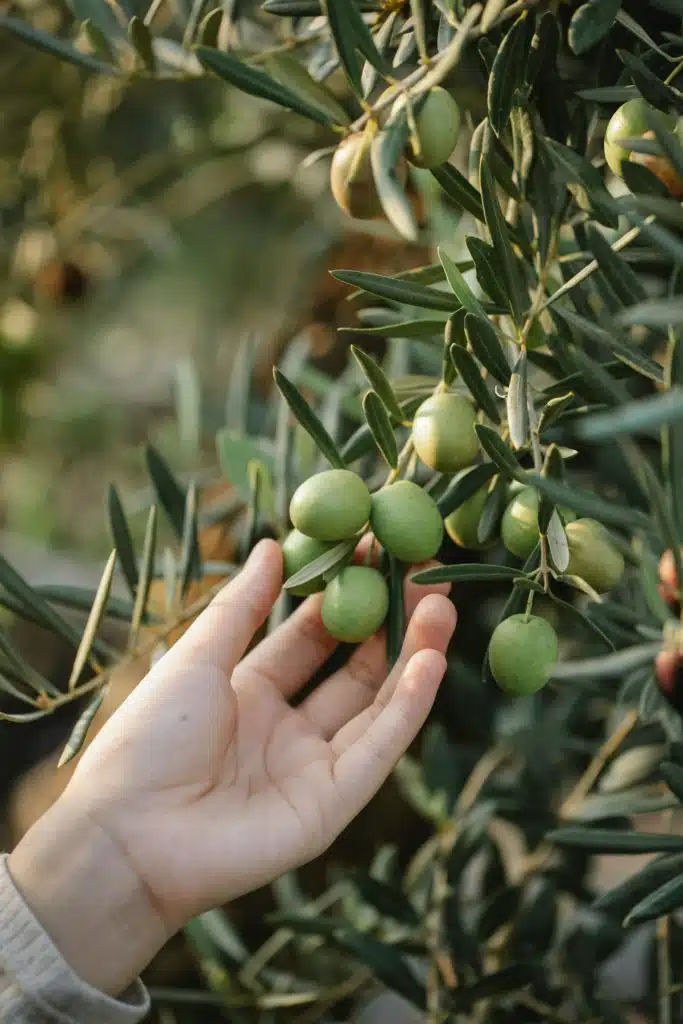
Greek Olive Oil: A Mediterranean Treasure to be Savored
Greek olive oil is much more than just an ingredient; it’s a true Mediterranean treasure. This flagship product of Greek gastronomy stands out for its exceptional quality and unique taste.
From ancestral olive groves, this oil is cold pressed, preserving its unique qualities. This process preserves its rich flavors and health benefits. From Crete to the Cyclades, each region brings its own distinctive touch, offering a variety of aromas.
In the kitchen, extra virgin olive oil enhances traditional Greek dishes, from salads to grilled meats. It represents the very essence of Greek culinary culture and invites you on a sensory journey through Mediterranean flavors.
The History of Olive Oil in Greece: A Millennial Heritage
The history of olive oil in Greece goes back thousands of years. Since Minoan times, the Greeks have cultivated olive trees and produced an oil that conquered the palates of ancient civilizations. This heritage continues to this day. Every drop of Greek olive oil tells the story of a land rich in tradition, where know-how is handed down from generation to generation.
Production techniques have evolved, but the essence of this oil remains intact. From the island of Crete to the hills of Attica, each region brings its own unique touch to olive oil. Traditional methods, such as cold pressing, guarantee exceptional quality, offering an authentic and incomparable taste experience.
Today, olive oil is much more than a culinary product. It has become a symbol of Greek culture, celebrated for its health benefits and its central place in Mediterranean gastronomy.

Handcrafted production that respects nature
Greek extra virgin olive oil is the result of an artisanal production process that respects the environment and nature. Greek olive trees, often centuries old, grow without chemicals, in harmony with natural cycles.
Producers carefully harvest the olives by hand. They are then cold-pressed to extract a pure oil, rich in aromas and nutrients. This meticulous process preserves all the organoleptic qualities of the oil, guaranteeing a high-quality product.
This artisanal approach not only promotes sustainability, but also highlights the know-how of local producers. By choosing Greek olive oil, you are supporting a production method that honors the land and its traditions.
Olive Oil Varieties in Greece: A Panorama of Flavors
Greece is renowned for its rich variety of olive oils. Each region produces an oil with distinct characteristics, reflecting the unique terroir of its place of origin. Among the most popular varieties, Koroneiki stands out for its robustness and intense fruity taste. It is often considered one of the best varieties for the production of top-quality olive oil.
Another popular variety is Kalamata, famous for its rich aroma and mild flavor. Olives from this region produce a velvety oil that enhances any dish.
The diversity of olive oils in Greece means that every enthusiast can find the one that perfectly matches his or her taste preferences. Whether you’re looking for a spicy, full-bodied oil or a milder, more delicate one, Greece has something for everyone.
How to distinguish Superior Quality Olive Oil?
Recognizing top-quality olive oil may seem complex, but there are several simple criteria to help you. First of all, make sure that the oil is extra virgin, which means that it must be extracted by cold pressing at a temperature below 27°C. This process preserves all its natural aromas.
Next, the color can vary from bright green to golden yellow, but it should be uniform and brilliant. Take a close look at the texture, as a quality oil is generally fluid and light.
Taste is a key indicator. A good olive oil should be balanced, with notes of fruitiness, fresh herbs, and sometimes a touch of pepper or almond. Finally, the absence of excessive bitterness or rancidity signals a well-preserved, quality oil. By taking these criteria into account, you can easily choose an authentic and tasty olive oil to enrich your dishes.

The Health Benefits of Olive Oil
Greek extra-virgin olive oil is not only delicious, it also offers numerous health benefits. Rich in monounsaturated fatty acids and antioxidants, it helps reduce the risk of cardiovascular disease. Its anti-inflammatory properties, combined with its high vitamin E content, make it a valuable ally for healthy skin and hair.
What’s more, regular consumption of olive oil helps maintain an optimal lipid balance, promoting overall well-being. By incorporating this oil into your diet, you are adopting a pillar of the Mediterranean diet, known for its benefits on longevity and overall health. In short, Greek olive oil is a tasty and beneficial choice that enriches your dishes while taking care of your health.
The origin and terroirs of Greek olive oil
Greek olive oil comes from a variety of terroirs, giving it unique characteristics. Olive groves located in mountainous regions, such as Epirus or the Peloponnese, produce oils with a pronounced taste, often spicier and more intense. On the other hand, olive groves in the fertile plains of Crete and Chalkidiki offer a sweeter, fruitier taste.
Each terroir brings its own particularities, making olive oil a true reflection of Greece’s geographical and climatic diversity. Differences in soil, climate and farming practices translate into a variety of flavors, allowing olive oil lovers to discover a wide range of tastes.
In short, Greek olive oil is much more than just a product; it embodies the traditional know-how and natural riches of each region.
Olive Oil in Greek Cuisine: An Essential Ingredient
Extra virgin olive oil is an essential ingredient in Greek cuisine. It is used to season salads and cook traditional dishes. Greeks use it to enhance the taste of grilled vegetables, fish and, of course, to prepare the famous Greek salad, where it enhances the flavors of tomatoes, cucumbers, onions and feta cheese.
Olive oil also forms the basis of many sauces and marinades, providing aromatic richness and velvety texture. Whether drizzled on a dish or used for cooking, this ingredient is omnipresent in every kitchen, testifying to its importance in Greek gastronomy. By incorporating olive oil into your cooking, you can experience the authentic flavors of Greece.
The Manufacturing Process: From Olive to Oil
Olive oil production is a complex process requiring skill and patience. After harvesting, the olives are sorted to remove any damaged fruit, then carefully washed. They are then crushed to obtain an olive paste, which is slowly kneaded to release the oil.
This paste is cold-pressed, a process that preserves all the oil’s nutritional and taste qualities. Finally, the oil is decanted and filtered before bottling. Each step in this process is essential to guarantee the highest quality olive oil. By respecting these traditional methods, Greek producers ensure that every drop of oil reflects the terroir and local craftsmanship.
The Impact of Olive Oil on the Local Economy
Olive oil plays a crucial role in the Greek economy. It is one of the country’s main exports, and represents an important source of income for many farming families. By choosing olive oil from small-scale producers, you are supporting not only sustainable agriculture, but also local traditions and the regional economy.
This direct relationship between producer and consumer also guarantees total traceability of the product, from the olive tree to your table. You benefit from authentic olive oil that reflects know-how handed down from generation to generation. By favoring local products, you’re helping to preserve traditional farming practices and support the local economy.
Discover Greek Olive Oil: An Unforgettable Sensory Journey
Tasting Greek olive oil is like taking a sensory journey. Every drop invites you to explore the landscapes, traditions and cultural richness of Greece. Whether to enhance your dishes or to benefit from its health benefits, extra virgin olive oil is a must-have for all Mediterranean cuisine.
Take the time to select a quality oil from local producers, and let yourself be carried away by its intense aromas and unique taste. This oil, a symbol of the Mediterranean, will enrich your meals while adding an authentic touch to your dishes.
| Greek recipes | Greece | Greek Products | Producers and Artisans | Must-See in Greece | Knossos Palace | Odeon of Herod Atticus | Acropolis | Skiathos | Kefalonia | Hydra | Milos | Temple of Apollo | Paros | Olive oil | Lesvos | Recipe of saganaki | The Tarama | Recipe of Keftedes | Greek yogurt | Recipe of Tarama | Rhodes | Thessalonica | Figs | Greek honey |




